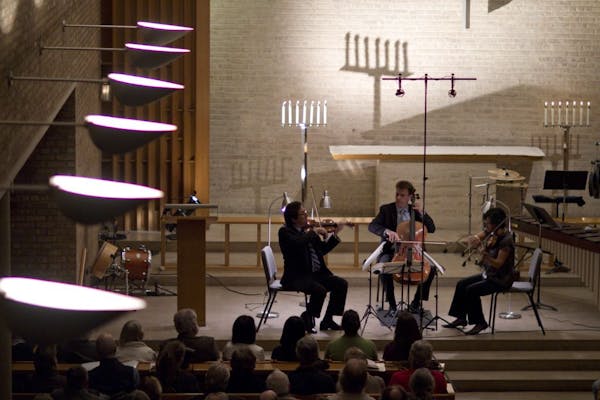If the members of the string ensemble Accordo, who ended their third season this week, had done little more than schedule their performances on Monday evenings, they would still have won the affection of local concertgoers (who turned out in force for the group's finale at Christ Church Lutheran in Minneapolis). Chamber-music devotees have long faced difficult choices on Sunday afternoons, when most small ensembles play; it's a gift to have an uncontested option on Mondays, when traditional venues are generally dark.
Happily, Accordo, which draws its personnel from the Twin Cities' two major orchestras, has more to offer than its calendar. And this is so, as this week's concert showed, even in the absence of St. Paul Chamber Orchestra concertmaster Steven Copes, Accordo's prime mover who is touring in Europe. Replacing Copes was the Minnesota Orchestra's new concertmaster, Erin Keefe, a splendid violinist with an imposing chamber-music résumé.
Keefe and three Accordo regulars -- violinist Ruggero Allifranchini, violist Maiya Papach and cellist Tony Ross -- opened Monday's program with Haydn's F-minor String Quartet, Op. 20, No. 5 (1772). As Ross noted during a brief talk, the six quartets of Op. 20 are landmarks, conversational yet weighty. To my ear, however, Accordo's account, despite its many felicities, sounded a bit bloodless. Nor did the musicians always display the stylistic unanimity of a well-seasoned foursome, which can seem to possess a single central nervous system.
The Haydn was quickly eclipsed by Ingolf Dahl's "Concerto a tre," for which Allifranchini and Ross were joined by Burt Hara, the Minnesota Orchestra's superlative principal clarinet. Born in Germany to Swedish parents, Dahl (1912-70) settled in Los Angeles in the late 1930s and worked as a composer and conductor for radio and film. Meticulously constructed, "Concerto a tre" (1946) integrates echoes of jazz (Benny Goodman was the clarinetist for the premiere), Igor Stravinsky (whom Dahl knew) and Aaron Copland. This was arguably the performance of the evening, virtuosic and incisive, capturing the inventiveness and whimsy of an almost forgotten piece.
The mellow, elegiac side of Brahms' rhapsodic and depressive Clarinet Quintet (1891) is sometimes exaggerated, but not by Accordo, which caught the turbulence in the first movement and the shift from autumnal to wintry near the end of the last. There was marvelous playing from all hands, with especially ravishing pianissimos from Hara. Still, I would have welcomed more fantasy and wildness in the impassioned Adagio, and more elastic tempos throughout.
Accordo's fourth season, expanded from three concerts to four, begins with a Hungarian-accented program on Oct. 15.

Minnesota Sports Hall of Fame: A class-by-class list of all members

This retired journalist changed professional wrestling from Mankato

